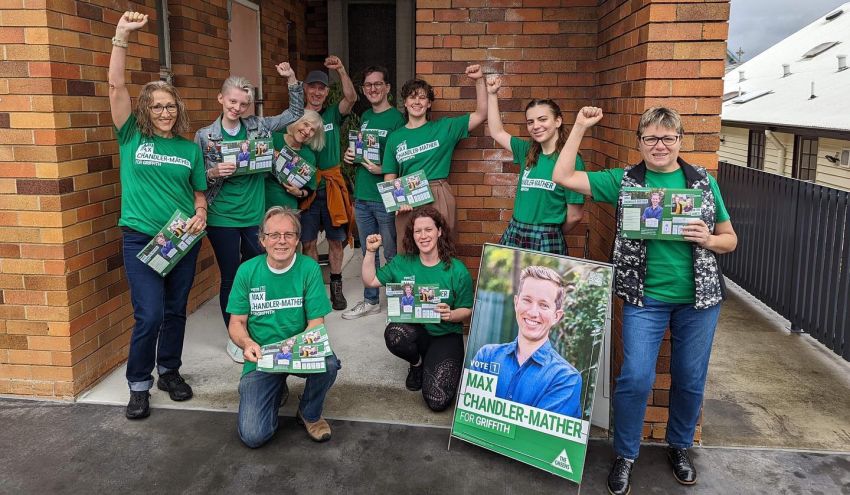
The Greens are waging an insurgent campaign to win the seat of Griffith in Brisbane’s south.
If candidate Max Chandler-Mather wins Griffith, considered one of the most winnable seats for the Greens, it will be the first time the party wrests a House of Representatives seat against an incumbent, in this case Labor’s Terri Butler.
Griffith, previously represented by former Prime Minister Kevin Rudd, has been comfortably held by Labor for all but two years since 1977. It incorporates the Gabba ward of the Brisbane City Council and the state electorate of South Brisbane — both held by the Greens.
Chandler-Mather is a strategist for the Queensland Greens and was campaign manager for Brisbane City Councillor Jonathan Sri. He told Green Left last August that the Queensland Greens had taken a “slightly different political and strategic approach” to the Australian Greens and that the party is beginning to adopt Queensland’s successful approach.
He said then a “political structure and movement” was necessary for successful grassroots election campaigns.
That approach combines door-knocking mobilisations with ambitious reform proposals including putting dental and mental care into Medicare, tackling housing affordability with the mass expansion of social housing and free childcare all funded by taxing billionaires.
An impressive team of doorknockers claim to have knocked almost every door in Griffith.
Chandler-Mather, among the most left of all Greens candidates, has also championed a four-day work week and “bringing whole sectors of the economy back into public ownership [including] electricity and telecommunications”.
On the Green Left Show last August, he was critical of capitalism saying: “We want to emancipate the large majority of working people from the cruelties and inequalities that capitalism produces ... Capitalism produces a lot of poverty, alienation, disconnection, individualisation, fragmentation and loneliness” and “the only way to address those is to fundamentally change the way our economy and political system works”.
He believes that a significant basis of support already exists for anti-establishment politics.
The Green vote in Griffith has been growing. Chandler-Mather won a 6.7% swing at the 2019 election. This came on top of a 6.8% swing to the Greens in 2016. The Liberal National Party won the largest share of first preference votes (41%) in 2019, and Labor won the seat on Greens’ preferences.
To win this time, the Greens need to beat Labor on first preference votes and then secure preferences from Labor to get past the Liberals. They say they need a 3.5% swing, based on the 7% difference between Labor and Greens candidates at the point when the Greens' were knocked out of the race in 2019.
If 3.5% who voted or preferenced Labor last time switched to the Greens, and other votes hold, the Greens will win.
If, as expected, there is a general swing from the Coalition to Labor, the Greens will need additional votes to match that unless the swing goes direct to the Greens.
Inevitably, the establishment is fighting back. Chandler-Mather said on May 10 that it “seems like Labor and the Liberals have both realised at the same time that we can win Griffith and are now sending attack flyers out to try to stop us”.
He commented that “they both have the same corporate donors so the same big corporations are probably funding both flyers”.
The Greens in Griffith played a leading role in defying the Brisbane City Council attempt to restrict election campaign signs to 150 per candidate. Chandler-Mather pointed out the hypocrisy saying: “There’s no limit to the number of billboards a party can buy — or TV ads”.